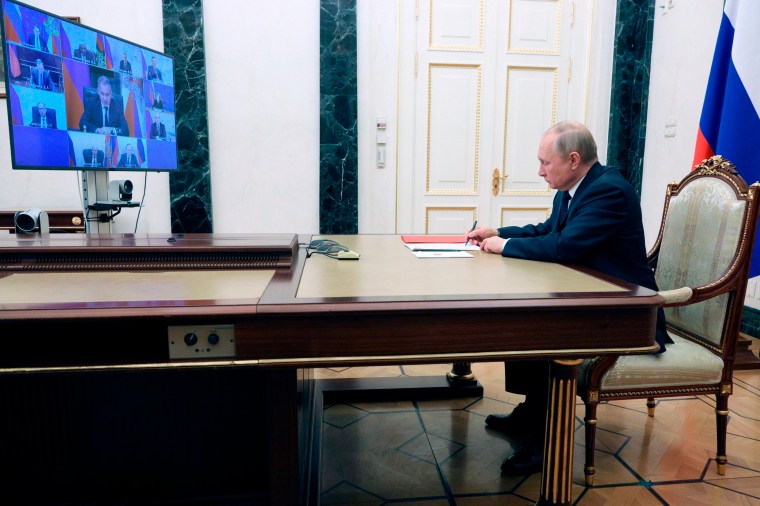Russia’s independent journalists are fleeing. That’s not only a tragedy for Russians but also for the rest of us who need to know what the increasingly isolated leader of a nuclear superpower is doing.
Since sending tanks into Ukraine on February 24, President Vladimir Putin has threatened to jail anyone who dares question the invasion and sought to control information flowing in from abroad. On March 4 he signed into law a bill imposing prison sentences of up to 15 years for spreading “fake” news about the Ukraine war. The law effectively criminalizes reporting by banning use of the word “war” or “invasion”. Reporters in Russia can only refer to Putin’s unprovoked aggression as a military operation.
More than 150 independent local journalists are reported to have gone into exile abroad and more are expected to follow. Others are laying low. Even Nobel laureate newspaper editor Dimitri Muratov instructed his Novaya Gazeta staff to comply with censorship by removing reports on Russia’s military actions in Ukraine from its website.
Putin has been squeezing the life out of the independent press since anti-government protests flared in 2011. But the speed and scale of the collapse of professional news-gathering this month are staggering. The implications of this collapse are equally staggering. Local journalists are not only vital sources of factual information for their communities – their work also enables businesses and governments to make informed decisions about markets and policy.
Some journalists who have left have pledged to continue reporting in exile, but censorship, repression, and separation from their local sources and audiences will hamper their newsgathering and their ability to tell Russians what they need to know about the effects of the war in Ukraine.
Ever since the crumbling of the Soviet Union, Russians who wanted independent, home-grown journalism could get it. In the analog world of the 1990s there was FM radio station Echo of Moscow (Ekho Moskvy) and Novaya Gazeta. The Kremlin eventually reined in broadcast television, but the internet age enabled innovation and spawned a myriad of digital outlets including TV Rain (Dozhd). These outlets, along with Western social media platforms like YouTube and messaging apps such as Telegram and WhatsApp, provided an alternative, especially for younger Russians, to the propaganda of state-affiliated television channels watched by the bulk of the country’s aging population.
But now Echo of Moscow has fallen silent. Dozhd TV is dark, its editor in exile. Novaya Gazeta’s war reporting is hamstrung by censors. Facebook and Twitter have been blocked or throttled. Foreign news outlets in Moscow are trying to figure out what the ban means for their operations and particularly the safety of their Russian staff. Many have suspended reporting and broadcasting. Those who have ventured back — like the BBC — are walking a tightrope. Russian reporters who have tried to cover anti-war protests have been swept up by the police along with the demonstrators.
In many regions of the world, free-thinking reporters and editors have joined the tides of refugees fleeing the cancer of authoritarianism. Media crackdowns in Hong Kong, Myanmar and Afghanistan have made it dangerous for reporters to work openly. Press freedom is losing ground. The democratic advances enjoyed since the 1989 fall of the Berlin Wall have been eradicated. Seventy percent of the world’s population, 5.4 billion people, now live in dictatorships, according to Sweden’s V-Dem Institute.
A few thousand Russian journalists were standing against this trend. Putin’s war machine just rolled over them.
They have limited options for refuge. In the past two weeks those in the media with Western visas have fled to the European Union and beyond. Those without visas have moved to countries like Turkey, Georgia, Azerbaijan and Kazakhstan, which do not impose entry restrictions on Russians.
Even then they are not always welcome. On March 5, Dozhd TV journalist Mikhail Fishman was barred from entering Georgia through Tiblisi’s international airport. Immigration officials gave him no reason for the ban.
Western governments and United Nations agencies have repeatedly pledged to uphold press freedom as journalists have come under attack from groups such as Islamic State and the Taliban and governments from China to Venezuela. Putin’s attempt to crush independent journalism gives them an opportunity to act on those commitments.
Governments can open their doors to at-risk journalists. Russian journalists should be given the visas they need to enter the EU, U.K., U.S. and Canada. The Biden administration should back its emphasis on the need for a free press expressed at its “Democracy Summit” in Washington in January. Canada and the UK should live up to their roles as co-chairs of the Media Freedom Coalition of 52 countries pledged to defend free media.
Russian media are already operating in the EU. The online news portal Meduza is in the Latvian capital of Riga. But Latvia, Lithuania, Estonia, the Czech Republic and Iceland are among the countries that have suspended visas for Russians. They and other countries in the Schengen zone could make exceptions for journalists. And not just Russians. Hundreds, if not thousands, of Ukrainian and Belarussian journalists and media workers are likely to have to seek refuge in the West as the fighting intensifies.
Non-government groups can assist too. Journalists want to keep working. Media development agencies and charities can help them set up newsrooms-in-exile as they did with Syrian and Afghan journalists. News organizations with east European language services or those needing translations can hire exiled journalists. Universities and research institutions can offer fellowships and study programs to exiled Russian journalists. Anything to keep them reporting or adding to their journalistic skills and knowledge.
Journalists in danger don’t need more speeches. They need our help.
